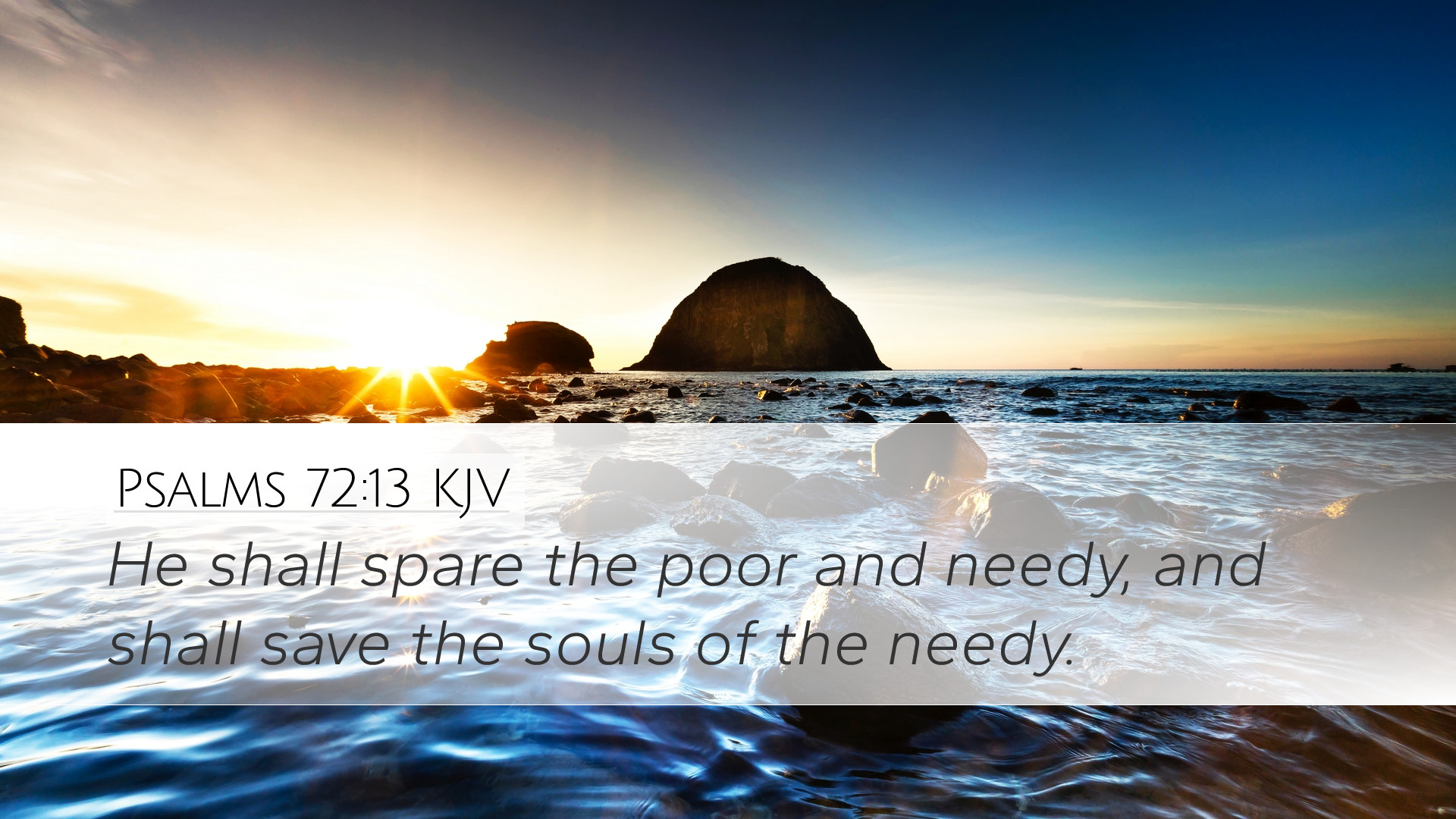Commentary on Psalms 72:13
Psalms 72:13: "He will have pity on the poor and needy, and the souls of the needy he will save."
Introduction
This verse is part of Psalms 72, attributed to Solomon, which acts as a royal psalm celebrating the reign of a righteous king.
It highlights the attributes of effective and godly leadership, particularly focusing on justice, compassion, and the welfare of the marginalized.
Overview of Public Domain Commentaries
Several esteemed commentaries provide profound insights into this passage. Among them are Matthew Henry, Albert Barnes, and Adam Clarke, whose analyses shed light on
the theological and practical implications of this verse. Each commentator emphasizes different dimensions of the text, fostering a multifaceted understanding.
Matthew Henry's Commentary
Matthew Henry notes that this verse emphasizes the king's role in showing mercy to the less fortunate. He explains that a true monarch, reflecting God's character,
manifests compassion toward the poor and needy. This is essential for societal justice and highlights a pivotal aspect of good governance:
- The Nature of Compassion: Henry interprets the 'pity' mentioned in the verse as more than mere sympathy; it is an active expression of kindness
that intervenes in the lives of those suffering, symbolizing a heart that resonates with human distress.
- Divine Reflection: The king’s actions serve as a reflection of God's own compassionate nature. This brings an understanding that leadership should echo divine attributes,
highlighting the moral responsibility of the ruler.
Albert Barnes' Commentary
Albert Barnes focuses on the implications of the phrase “he will have pity.” He indicates that this verse presages the messianic reign and illustrates key qualities of the
expected deliverer:
- Messianic Foreshadowing: Barnes suggests that the heartfelt compassion for the needy signifies Jesus Christ's ministry, as He
exemplified selfless benevolence during His earthly life, especially toward the poor in spirit.
- Power of Intercession: The saving of souls mentioned reflects the holistic ministry of Christ, emphasizing that salvation is comprehensive – it includes
physical, emotional, and spiritual dimensions.
Adam Clarke's Commentary
Adam Clarke presents a thorough analysis of the context surrounding this passage, stressing the importance of social justice. In his reflections, he draws
attention to:
- Role of Kings: Clarke posits that the ideal ruler must prioritize the needs of the marginalized, illustrating the importance of a government
that caters to the poor as a significant criterion for its legitimacy.
- Hope and Salvation: The "souls of the needy" signify a broader spiritual depth, emphasizing that the king must seek not only to alleviate
physical suffering but also to restore and save the very souls of those in despair.
Theological Insights
The combined insights from these commentators reveal a multidimensional perspective on Psalms 72:13. Theological reflection on this verse provides rich
applications and challenges for contemporary leaders and clergy:
- Justice and Mercy: A theological inquiry into the balance of justice and mercy as essential characteristics of godly leadership. Pastors and theologians must ask
how these qualities are manifested in their own ministries.
- Social Responsibility: The passage challenges believers to scrutinize their responses to societal inequities. The question arises: how does the church
embody the role of advocating for and providing for the needy?
Practical Applications
For pastors and church leaders, the interpretation of Psalms 72:13 invites actionable steps toward embodying compassion and mercy in ministry:
- Community Outreach: Initiate and support programs aimed at aiding the marginalized and impoverished within the community, reflecting God's heart.
- Educational Efforts: Create awareness and educate congregations about the importance of social justice, encouraging active participation in advocacy.
Conclusion
In summary, Psalms 72:13 serves as a profound reminder of the responsibilities that come with leadership in God’s eyes. By integrating the insights of Matthew
Henry, Albert Barnes, and Adam Clarke, we gain a deeper appreciation for the necessity of compassion in leadership. This passage also holds significant weight
in guiding contemporary believers and church leaders towards a life that reflects the merciful and just character of God.


